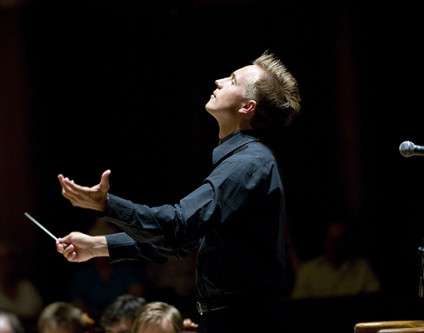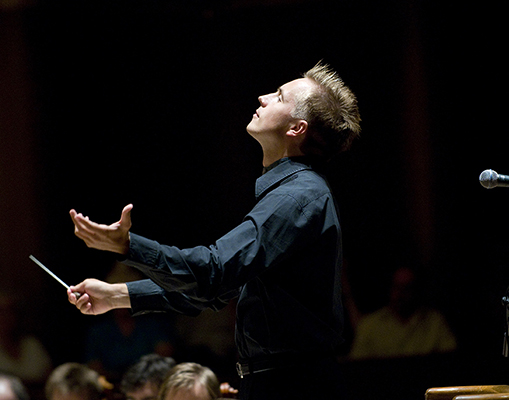 United Kingdom Korngold, Delius, Respighi, & Stravinsky: Royal Liverpool Philharmonic Orchestra / Vasily Petrenko (conductor), Guild Hall, Preston, 8.10.2017. (MC)
United Kingdom Korngold, Delius, Respighi, & Stravinsky: Royal Liverpool Philharmonic Orchestra / Vasily Petrenko (conductor), Guild Hall, Preston, 8.10.2017. (MC)

Korngold – Theme from The Sea Hawk
Delius – Two Pieces for Small Orchestra: On Hearing the First Cuckoo in Spring and Summer Night on the River
Respighi – Suite, The Birds
Stravinsky – The Firebird (original version, 1910)
For its opening concert in this season’s Preston series the Liverpool Philharmonic under Vasily Petrenko performed with genuine distinction a popular and accessible programme titled ‘The Birds’ containing a marked international feel. The orchestra seems to have added additional finesse and style to its renowned dramatic and colourful playing and the result was a most potent one.
Opening the concert was Korngold’s stirring theme from his score to the Michael Curtiz Hollywood epic The Sea Hawk from 1940. In accordance with the custom of the time at Warner studios Korngold’s piano score was orchestrated by a team of arrangers notably Hugo Friedhofer who rarely gets a mention. Under Petrenko’s baton it was easy to imagine the refreshing salt spray of the sea and swashbuckling antics of film star Errol Flynn as Geoffrey Thorpe the captain of a group of privateers who capture a Spanish galleon. In the passionate passages the tender playing perfectly evoked the love scenes between Captain Thorpe and Spanish Ambassador’s daughter Doña María. Outstanding was the unified sound of the string section which has developed an elevated level of excellence in recent years.
I’m not sure how often Petrenko conducts Delius but on this evidence, he seems eminently suited to this warmly atmospheric music. The two pieces for orchestra chosen On Hearing the First Cuckoo in Spring and Summer Night on the River with their wealth of sensuous textures were played with aplomb, convincingly creating a world of impressionist nature paintings. With woodwind suggesting birdsong exceptionally the flute, clarinet and oboe took their opportunity to shine with both hands.
Although one of Respighi’s best loved works on the concert platform I was hearing his suite The Birds for the first time in a long while. His late-Romantic idiom was ingeniously fused with elements of Italian Renaissance and Baroque music heard to great effect in his tone poems of which his five-movement suite The Birds is a significant example. With each movement based on the music of a Baroque composer here Respighi has successfully managed to incorporate both song and actions of birds into his music. The players relished this bold, regal, often festive writing combining a velvety quality with brilliance and real panache. With many solo contributions offered in the score especially memorable were the woodwind principals and pair of clarion trumpets.
The second half of the concert was given to Stravinsky’s fairy tale ballet in two acts The Firebird. Stravinsky’s first score for Diaghilev and the famous Ballet Russes The Firebird is one of his finest achievements; certainly, his earliest real success. Wisely Petrenko chose to conduct the full ballet score rather than one of the suites. Augmenting the brass section were four onstage Wagner tubas and three trumpets positioned apart on the walkway above the stage. With the elegant Russian maestro insisting upon dynamic energy levels from the orchestra and with tempi generally on the swift side, I treasured the forthright treatment and full-blooded Romanticism. Petrenko ensured that the Dance of the Firebird simply skittered and scampered along with wondrous lightness. Played with utmost sincerity the Supplication of the Firebird was given a chilling and ghostly rendition. Beautifully and sensitively played, the Khorovod of the Princess was bewitching with glorious woodwind playing here especially from the principal oboist who all afternoon made the most of his opportunities to shine. The rapidly shifting rhythms of Kashchei’s infernal dance evoked a wild revelry and by contrast the Berceuse (Lullaby) was hauntingly tender; as soft as feathery down. In the Finale the playing of the crucial and exposed horn solo, immediately followed by the harp, was stunning. Staying in the memory the effect of the dynamic Finale was quite dramatic generating lots of decibels. Immediately afterwards I felt that there is no other conductor I would have conduct Stravinsky’s The Firebird than Petrenko.
Michael Cookson
